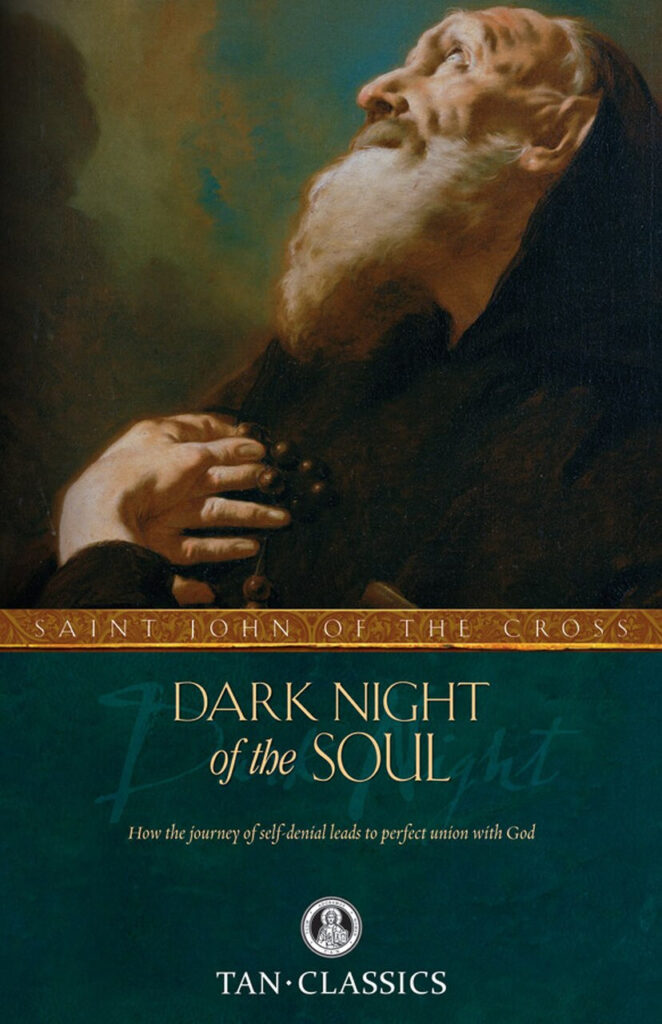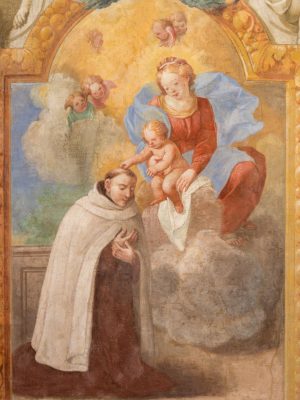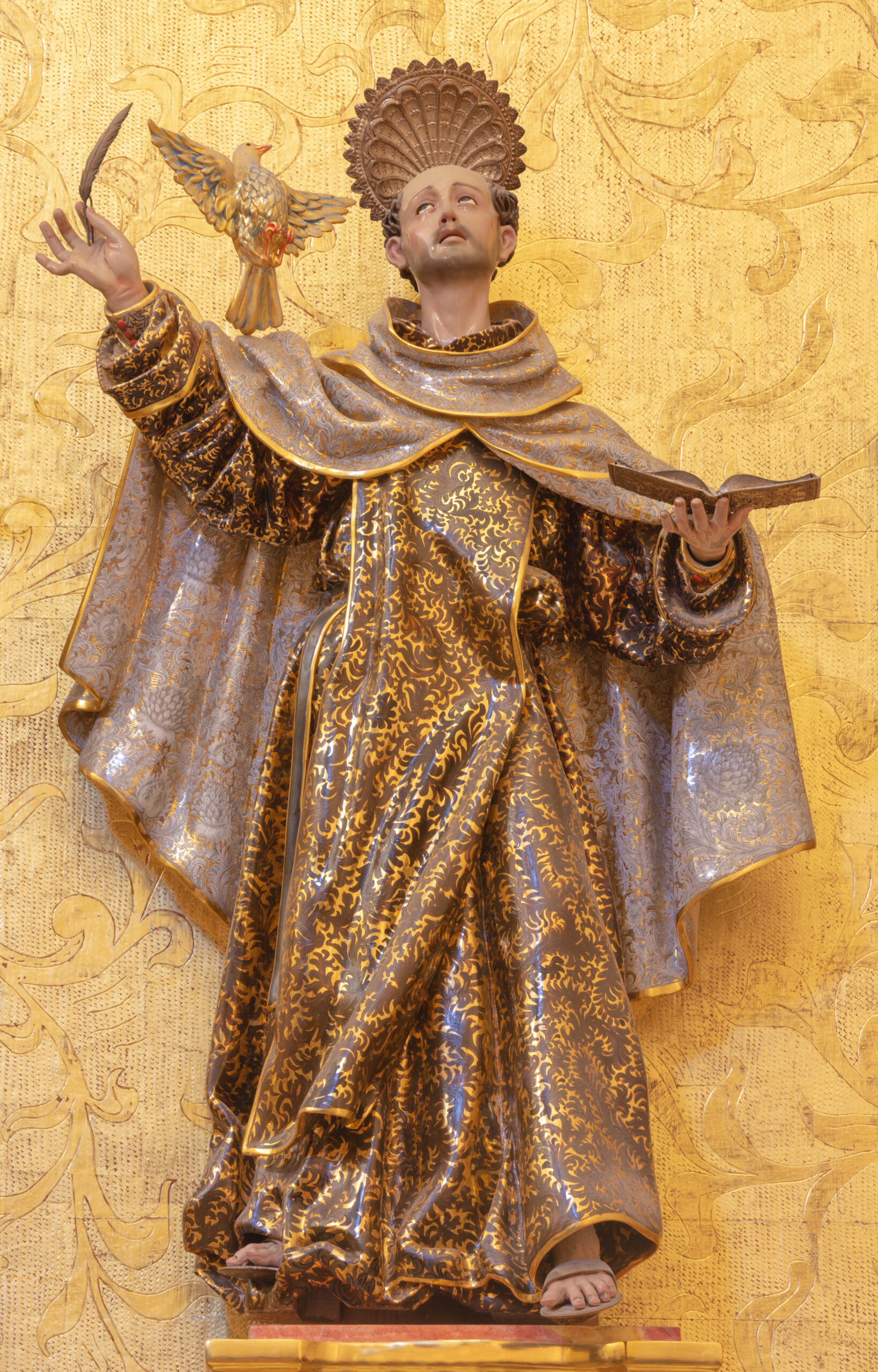The following is an Introduction penned by Fr. Benedict Zimmerman for Dark Night of the Soul by St. John of the Cross.
The Dark Night, though only a short treatise in comparison with the remaining works of St. John of the Cross, is perhaps from a practical point of view the most important of the whole series. Instructions for beginners may be found in abundance; even the Night of the sense, as St. John informs us, has had numerous exponents; but in the Night of the spirit he breaks fresh ground. If it is one of God’s ordinances that all spiritual life must be regulated by a director so that pitfalls may be avoided, a soul plunged into the Night of the spirit depends more than any other upon the intelligent guidance of an experienced director, partly on account of its natural reluctance to proceed along a path beset with so many difficulties, partly because the very fact of its being in darkness prevents it from seeing clearly with its own eyes. In the Ascent and the Dark Night St. John has traced the way with admirable lucidity and simplicity, but these books, especially the latter, are chiefly addressed to the director. It is impossible to read them without gaining the conviction that his is the absolutely safe way; there may be others, less straight, less rugged, but neither so safe nor so direct.
St. John, taking his position on the firm basis of the psychology and theology of St. Thomas Aquinas, and guiding himself by the light of Holy Scripture, pitilessly dissects the soul and its operations, separating not only what is dangerous or unsound, but everything that is not directly conducive to his ultimate aim, the union of the human will with the holy will of God. A work of this magnitude must be begun by God, and accomplished by Him. The beginning consists in the grace of vocation, the end in the beatific vision. Between these two there lies a vast distance which it takes a lifetime to cover, where the generous and intelligent co-operation of the soul is indispensable. This is partly active, and consists in the systematic denial of everything that could give satisfaction to body or soul, as explained in the Ascent; and partly passive (as shown in the Dark Night), where the soul assists God’s operation by submitting to His chastising hand, like a patient under the knife of the surgeon.
The number of souls called to the contemplative life in its widest sense is even nowadays greater than is commonly supposed. They are not confined to Religious Orders, but are to be found in every station of life, and in every country, for “the spirit breatheth where it will.” Many proceed no farther than the initial stages; few persevere as far as the spiritual night; while those who attain to perfection are but exceptions. “Many praise and bless Jesus as long as they receive some consolation from Him, but if He hide Himself and leave them for a little while, they fall either into complaining or into excessive dejection.” This general falling off may be partly attributed to a want of understanding and guidance which St. John in the book before us undertakes to remedy.
It may be useful for some readers of St. John’s works to find here a short sketch of the experiences a soul generally makes on its journey through the realms of Mysticism. Let us suppose that it has been unexpectedly struck by a ray of divine grace. It may never really have been estranged from God since the day of baptism, or it may have strayed; no essential difference would result there from, because motion is determined not so much by the direction whence it proceeds but whither it tends. Such a soul, then, finds a delight, hitherto unknown, in spiritual matters; a new chord has been touched and set vibrating, the whole world seems transfigured, God’s work becomes visible and palpable in every blade of grass, His interests absorb all earthly pursuits; the human heart has found and holds fast a treasure of incomparable value; heaven has descended upon earth. “This is he that heareth the word and immediately receiveth it with joy.”
Such an experience is indeed a great grace, but it does not last. True spirituality consists not in sentiments but in the exercise of virtue. The first impulse is not strong enough to carry the soul very far in its flight heavenwards. The question arises how best to utilize this initial motive power? St. John gives the answer in the Ascent. Almost ruthlessly he tears off the brilliant surface so as to save the substance. The first ray has indeed transfigured the heart but has not transformed it. There remain many dangerous germs, the weaknesses and shortcomings of human nature. The very warmth of paradise, the dew descending abundantly upon a tender heart, might develop these so that “the last state of that man is made worse than the first.” They must, therefore, be destroyed by a long process of self-denial. St. John teaches the beginner how to mortify his senses and faculties, sacrificing even much that in itself is good, in order to strengthen the soul by the simple exercise of Faith, Hope, and Charity, and the four cardinal virtues. This is the active purgation.
But this represents only the smaller portion of the work to be done. However, it prepares the way for Him who “searcheth the reins and hearts.” The passive purgation follows closely upon, and sometimes accompanies the former. The passive purgation of the sense is not merely a reaction from the exultation of the first awakening to spiritual life, it cuts far deeper. Were it only a reaction it would end in lukewarmness, but he who is being tried by God, so far from growing indifferent, becomes the more diligent in seeking God, the more God appears to hide Himself, for he feels His absence keenly. “It is a great thing,” says the author of the Imitation, forestalling St. John of the Cross, “a very great thing to be able to do without all solace, both human and divine, and to be willing to bear this exile of the heart for the honor of God, and in nothing seek self, and not to have regard to one’s own merit. What great thing is it to be cheerful and devout when grace comes to thee? This is an hour desirable to all.”
This purgation of the sense comes in different ways, such as reverses of fortune, loss of friendship, loss of one’s reputation, ill success in one’s undertakings, illness, and the whole train of temporal misfortunes. It is always accompanied by the loss of sensible devotion. To keep still under the chastising hand of God elevates the soul to the plane where the holy man Job stood. If we have received good things at the hand of God, why should we not receive evil? The active purgation through which the soul has passed under the guidance of St. John of the Cross is the best preparation for this passive purgation of sense, for there it has learnt to utterly despise all comfort.
Far more terrible, as our author tells us, is the passive purgation of the spirit which reaches “unto the division of the soul and the spirit, of the joints also and the marrow.” Of course there are different degrees, all souls are not tried to the same extent, and St. John takes rather an extreme case. In the most acute form, then, positive Satanic interference adds to the distress of a soul already weighed down by a feeling of the loss of God.
Sometimes it takes the shape of a spirit of blasphemy, or of uncleanness or despair. The lives of the Saints furnish some remarkable instances of such trials. St. Mary Magdalen de Pazzi was subject to them for five years. St. Francis de Sales was; for a long time, haunted by the thought that he should be finally lost. The effect it had upon him was to render him extremely conscientious so that he should offend God not even in small matters, and that his loss should not come through his own fault. “Although He should kill me I will trust Him; but yet I will reprove my ways in His sight.”
It stands to reason that a soul under such trials is absolutely dependent upon the guidance of a learned and experienced director. Otherwise the result might be fatal. In fact there is reason to think that some of the appalling falls from spiritual height to utter perversion should be attributed to the absence of proper direction during this most dangerous period. The purpose of these trials is, however, not to throw the soul into despair but to wean it from all comfort so as to leave it with no other support than God Himself, as St. John says in one of his poems:
My soul is detached
From every thing created,
And raised above itself
Into a life delicious,
Of God alone supported.
And therefore I will say,
That what I most esteem
Is that my soul is now
Without support, and with support.
Or, as it is expressed in some verses attributed to him:
On Mount Carmel God alone and I.
God alone in my spirit to enlighten it,
God alone in my acts to sanctify them,
God alone in my heart to possess it.
This is one of the objects of the passive purgation. Sooner or later every soul must pass through it. All that is of earth earthly will have to be left on one side before that which is of heaven heavenly shall appear. The process is under all circumstances a painful one, but it is unavoidable St. John assists the soul in stripping itself, and allowing itself to be stripped here below. He calls this a purgatory, but a very different one from what awaits the soul after death, inasmuch as there the soul is cleansed by fire, and here by love. Moreover, the perfect purgation of the soul in the present life leaves it free to act with infinitely greater power, and therefore to gain innumerable merits, whereas after death the account is closed before even the soul enters purgatory. No power on earth could resist a thoroughly detached soul—it might almost be said to participate in God’s omnipotence. Here lies the secret of the marvelous deeds of so many Saints.
There is one other reason why the soul should pass through the trials of the Dark Night. Its ultimate destiny is union with God. Now the soul is finite, and God is infinite. The disproportion between the two is so enormous (being, in fact, infinite in itself) that the mere comparison must have a crushing effect upon the finite being. Every soul will have to pass through this experience, the minority already in this life in the dark Night of contemplation, the vast majority on leaving this life, when they will suddenly find themselves encompassed by the infinite Majesty and Power of the Godhead. When the finite comes into contact with the infinite it realizes its utter nothingness; it is humbled to the ground. The contrast causes it the most intense pain. This thorough humiliation makes it possible for the infinitesimal to be united to the infinite, for, as Christ says, “he who humbleth himself shall be exalted.”
An important point clearly established by St. John is the length of the trial. This depends, no doubt, on many circumstances—on the thoroughness of the purgation, on the amount of co-operation on the part of the soul, probably also on the kind of imperfections to be removed; the more subtle these are the more difficult are they to eradicate. But on the whole it is not probable that a soul would remain plunged in deep darkness for many weeks together, without being comforted and strengthened by at least some passing rays of light, some consolation to give it courage. Perhaps a very strong soul would require but few interruptions of this kind, but, excepting some highly favored souls, an alternation of glimpses of light and deep shadows seems to be the more usual experience. On this condition the Dark Night may continue for several years, and may even be repeated in different degrees of intensity. It is necessary to bear this in mind, for the study of mystical works sometimes leaves the impression that the various experiences follow each other in regular and rapid succession, and that there can be no turning back unless it be a falling away.
As the soul enters the Dark Night gradually so it emerges from it by degrees. Both in the Ascent and in the work before us St. John proceeds so far as the dawn of a new and glorious day. Of the full noonday he treats in the Spiritual Canticle and the Living Flame of Love. There the will is firmly united with the Will of God, the only kind of permanent union between man and God possible in this life. It is the height of perfection and so far above ordinary human experience that mystical writers, St. John included, have found it necessary to use expressions of oriental exuberance, the ordinary language being quite inadequate to describe the happy condition of a soul arrived at this state. It stands in marked contrast with the almost grim sobriety of the expositions in the Ascent and the Dark Night. Those who wish to form an opinion of the character of St. John should study both categories of his writings, otherwise he would appear to some as a stern, morose taskmaster, with never a smile on his lips, and to others as a dreamer of fantastic dreams, whereas he was a Saint with a wide heart and intense love, a most passionate love of his God, and, for God’s sake, of his neighbor; and, with all that, a man of practical work and common sense.
This article is taken from the Introduction of Dark Night of the Soul by St. John of the Cross, which is available from TAN Books.








